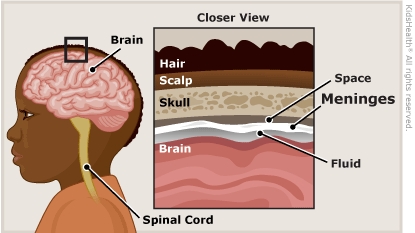Bacterial meningitis happens when bacteria (a type of germ) cause inflammation (swelling and irritation) of the covering of the brain and spinal cord (called the meninges). Your child was treated with antibiotics and can now be cared for at home. Children need close follow-up as they recover from bacterial meningitis, so make sure your child goes to all recommended checkups.


Be sure to:

Your child:

Your child:

How is meningitis diagnosed? Health care providers do a lumbar puncture (spinal tap) to test a sample of the cerebrospinal fluid that surrounds the brain and spinal cord. Your child's test results showed that the meningitis was caused by bacteria.
Is bacterial meningitis contagious? Yes. The different types of bacteria that cause meningitis spread in different ways. Some can spread through droplets when an infected person coughs or sneezes. Others can spread when someone eats food that is contaminated with bacteria. Your child should cough and sneeze into a tissue or an elbow. Until all symptoms are gone, caregivers should wash their hands well and often, and cups and utensils should not be shared.
Can meningitis be prevented? Safe and effective vaccines protect against some of the types of bacteria that can cause meningitis. Talk to your health care provider to make sure your kids have had all recommended vaccines for their age, particularly the pneumococcal and meningococcal vaccines.